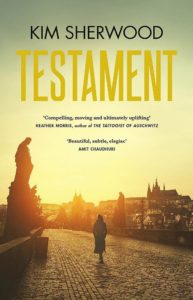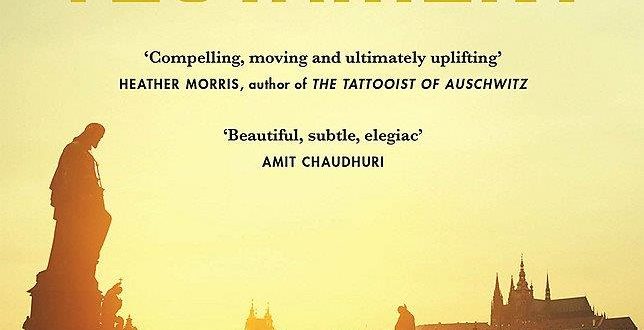 Kim Sherwood’s novel Testament weaves together the stories of Eva, a 24-year-old University student and her Grandfather, Silk. In need of cheap accommodation, she had gone to live with him in London and had cared for him in his final years.
Kim Sherwood’s novel Testament weaves together the stories of Eva, a 24-year-old University student and her Grandfather, Silk. In need of cheap accommodation, she had gone to live with him in London and had cared for him in his final years.
The novel begins with Silk’s death. It is reported on the BBC news as he was one of England’s greatest 20th Century painters. Much was known about his art but the early life of this Hungarian Jew and how he survived the Holocaust has remained shrouded in mystery. Strangely he has always maintained that he remembers nothing of this time and that his life started when he arrived in England as an eighteen-year-old refugee.
When Eva starts to sort through his possessions in the Blue room, his studio, she finds a letter from the Jewish Museum in Berlin which had arrived months ago. They had found the testimony Silk gave to the National Relief Committee for Deportees in Hungary about the years he spent in forced labour camps. Their researcher, Dr Felix Gerschel, wanted him to come and see it and asked for permission to use it in an exhibition of survivors who went on to become artists.
Silk had told Eva he was not at all interested and instructed her to rip it up. But she had left it with him.
There was a contact number to ring and, keen to find out more about the hidden life of her grandfather, she picks up the phone, rings Dr Felix and impulsively books a flight to view Silk’s testament in Berlin.
It marks the first leg of a lengthy odyssey during which she will travel to several countries to uncover the truth about Silk.
But first, she had to go back to London for the funeral. John her father, despite telling her he would not be attending unexpectedly turns up.
There was hatred between him and his father and John had not bothered to visit Silk for many years. He shows no grief.
“All Joseph Silk ever did was lie, lie, lie!” he tells his daughter. Should Eva believe this difficult, angry man who had been a negligent abusive father or was it just his way of trying to destroy the affection she had for Silk.
Throughout the book, Silk’s story and Eva’s are told in alternating chapters. Silk’s story about life in the forced labour camps is extremely harrowing and full of unbearable suffering. It may be too distressing for some readers.
In contrast Eva’s story, while containing many poignant moments is more positive. Freed from the responsibility of taking care of her grandfather she is able to travel and broaden her horizons.
As she slowly unravels the tangled web of Silk’s earlier life she grows in her understanding of how the Holocaust cast its shadow not only over his life but over that of her father and hers as well.
There does comes a moment when an unexpected truth about Silk is revealed that deeply affects her. Is there any possibility that this knowledge could help to mend the fractured relationship she has with her father?
Although Testament is fiction the author has drawn on her own experience of losing a loved grandfather and having a grandmother who was a Holocaust survivor.
The result is a beautifully crafted novel, well deserving of winning the Bath Novel Award and a gripping read.
Testament could also be read as a cautionary tale. There are lessons to be learnt from history. Due to the large influx of refugees, racial tensions in Europe are once again on the rise.
Holocaust stories such as these can be a powerful reminder not to let hatred escalate but to seek peaceful solutions.
This month we’re giving away a copy of Testament as part of the GrownUps July book competition. Enter here for your chance to win.
Title: Testament. Author: Kim Sherwood. Publisher: Hachette. RRP: $37.99









Join the Discussion
Type out your comment here:
You must be logged in to post a comment.